The team
Principal investigators
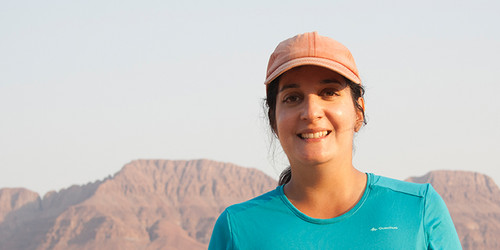
Prof. Dr. Eleftheria Paliou
Email: epaliou1uni-koeln.de
Homepage: https://archaeologie.phil-fak.uni-koeln.de/personen/eleftheria-paliou
Dr. Eleftheria Paliou, Professor of Computational Archaeology (Archäoinformatics) at the University of Cologne, is involved in the development and application of computational methods in archaeology. Her research focuses on investigating the fresh lines of archaeological enquiry these methods encourage, as well as their conceptual contribution to the social analysis of built environments and cultural landscapes. Her work is more widely concerned with the relationship between spatial and social organization in prehistoric and historic cultures, and the ways in which past societies conceptualize and attribute meanings to their environment.
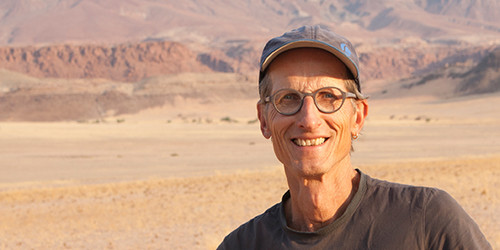
Dr. Tilman Lenssen-Erz
Email: lenssen.erzuni-koeln.de
Homepage:https://www.uni-koeln.de/sfb389/staff/lenssen-erz/e_lenssen_erz_zur_person.html
Dr. Tilman Lenssen-Erz (deceased 2023) was an archaeologist with a focus on prehistoric rock art in Africa. In recent years his research has shifted from rock art documentation and contextual archaeology to scientific cooperation with indigenous trackers. This has led from reading prehistoric footprints in French picture caves (Tracking in Caves, which allowed the exact reconstruction of human activities in the Pleistocene) to the IKAi and MPJ project. In addition, he was leading projects on research data management and digital archiving (AAArC, SPP Entangled Africa).
Scientific staff

Dr. Oliver Vogels
Email: oliver.vogelsuni-koeln.de
Homepage: https://archaeologie.phil-fak.uni-koeln.de/personen/oliver-vogels
https://fast.phil-fak.uni-koeln.de/mitarbeiterinnen/doktorandinnen/oliver-vogels
Dr. Oliver Vogels is an archaeologist focusing on prehistoric rock art, hunter-gatherer subsistence strategies, landscape archaeology and prehistoric musical cultures. His previous research work includes participation in rock art documentation and analysis (Dâureb/Brandberg (Namibia), Wadi Sura Cave, Egypt), as well as in archaeological excavations of Pleistocene hunter-gatherer sites (CRC 806 project B1), and project coordination (CRC 806 project Z1). In his dissertation, he deals with the question of land use patterns of prehistoric hunter-gatherers in the Dâureb/Brandberg, using spatial and statistical analyses of rock art sites.

Dr. Andreas Angourakis
Email: aangourauni-koeln.de
Website: https://archaeologie.phil-fak.uni-koeln.de/personen/dr-andreas-angourakis
Dr. Angourakis is a computational archaeologist with a strong background in Humanities and Social Sciences, specialising in simulating socio-environmental systems in the past. His main concern has been to tackle meaningful theoretical questions about human behaviour and social institutions and their role in the biosphere, as documented by history and archaeology. His research has focused specifically on how social behaviour reflects long-term historical processes, especially those concerning food systems in past small-scale societies. Among the aspects investigated are competition for land use between sedentary farmers and mobile herders (Angourakis et al. 2014), cooperation for food storage (Angourakis et al. 2015), origins of agriculture and domestication of plants (Angourakis et al. 2022) as well as the sustainability of subsistence strategies and resilience to climate change (Angourakis et al. 2020, 2022). He has also been actively involved in advancing data science application in archaeology, such as multivariate statistics on archaeometric data (Angourakis et al. 2018) and the use of computer vision and machine learning to photographs of human remains (Graham et al. 2020). He is currently also affiliated as Research Associate to the Ruhr-University Bochum with roles in the Leibniz-ScienceCampus "Resources in Transformation'' and the NFDI4Objects project.
Indigenous trackers

Jan Tsumib
Traditionally trained, professional tracker of the Hai//om, was born in Etosha before he and the other traditional inhabitants were forcibly resettled in 1954 because of the nature park declaration. He later worked as a game warden and tracker for the park administration. Since the year 2000 participant in an ethnohistorical project of the University of Cologne (SFB 389 ACACIA) on the history of the Hai//om in Etosha.
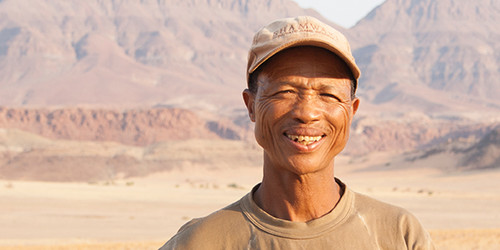
Ui Kxunta
Traditionally trained, professional tracker from the Nyae Nyae region in the Kalahari. Certified as Master Tracker (highest level) according to the South African CyberTracker System. Tracker for many years in various companies for trophy hunting. Since 2013 he is also working in the scientific project Tracking in Caves, in which prehistoric footprints are analysed.

Thui Thao
Traditionally trained, professional tracker from the Nyae Nyae region in the Kalahari. Certified as Master Tracker (highest level) according to the South African CyberTracker System. Tracker for many years in various companies for trophy hunting. Participated in a study in the 1990s, in which the reliability of tracking responses was examined (result 95-98% correct response)[1]. Since 2013 he is working in the scientific project Tracking in Caves.
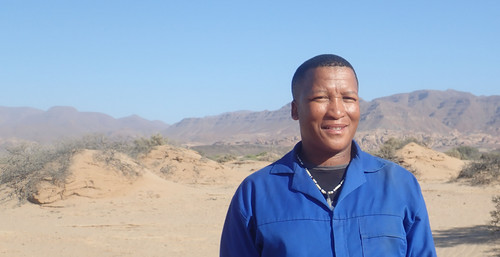
Tsamkxao Ciqae
Traditionally trained tracker of the younger generation from Tsumkwe. Certified as Namibian Tour Guide (Level 2). Many years of experience as a guide, today he runs his own tourism company, which provides experience with traditional San lifestyles. In addition to tracking, he is responsible for translations and logistical tasks. Since 2013 he is working in the scientific project Tracking in Caves.
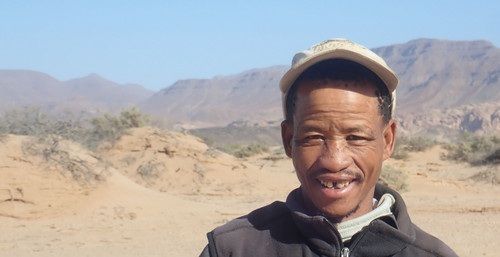
N!ani Cwi
Traditionally trained tracker of the younger generation from the Nyae Nyae region of the Kalahari. Already part of the IKAi project since 2021. One of our most agile trackers with enormous stamina.
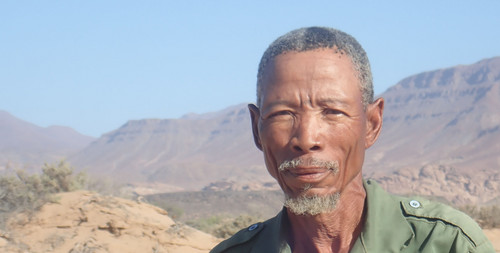
Elie Gǂxao Kgao
Traditionally trained tracker from the Nyae Nyae region of the Kalahari.
Already part of the IKAi project since 2021.
Research assistants
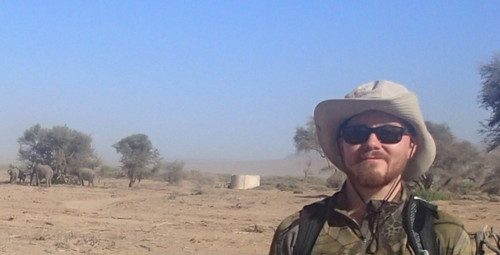
Simon Kellers
Email: simon.kellers@uni-koeln.de
Homepage: https://archaeologie.phil-fak.uni-koeln.de/personen/simon-kellers
Simon Kellers is a Master's student at the University of Cologne and a student assistant in the IKAi project, responsible for the cybertracker database, audio and video recordings, and mapping the ground conditions in GIS. He also curates the project homepage of our project as well as the MPJ project. His research interests are in the field of the older Stone Age, archaeoinformatics and excavation technology. He wrote his bachelor's thesis on pits from the Magdalenién open-air site of Bad-Kösen Lengefeld, in whose excavation activities he was involved between 2014 and 2018.
Associated researchers

Kaarina Shagwanepandulo Efraim
Email: kaarinaefraimgmail.com
Kaarina S. Efraim, is curator for archaeology at the Natinal Museum of Namibia in Windhoek. Her research focuses on the integration of the public into archaeological research. She is also dealing with this topic in her master's thesis.
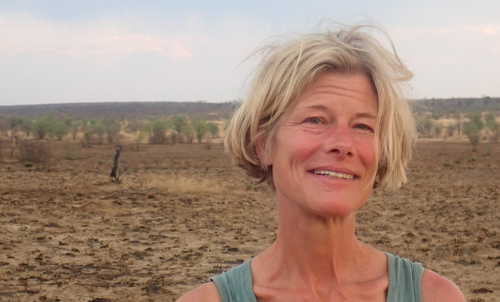
Dr. Ute Dieckmann
Email: ute.dieckmannuni-koeln.de
Dr. Ute Dieckmann is a Principal Investigator in the DFG-AHRC funded project Historicising Natures, Cultures and Laws in the Etosha-Kunene Conservation Territories of Namibia: From Deutsch Südwestafrika’s “Game Reserve No. 2” to “Kunene People’s Park”? (Kunene Etosha Histories).
She also is an anthropologist at the University of Cologne with more than two decades of research experience (ethnographic, archival, oral history and livelihoods enquiry) in Namibia. She worked both in academia and for Namibian and international non-governmental organisations.

Golda Ha-Eiros
Email: goldahaeirosgmail.com
Golda Ha-Eiros is a Senior Curator of Anthropology at the National Museum Windhuk.
With over 10 years experience within the Namibian Heritage Sector, she is passionate about postcolonial theory, the development of arts and cultural heritage in Namibia. In 2019, she was a guest researcher at the Ethnologisches Museum Berlin where she researched the historical collection from Namibia and co-curated an exhibition on the collaborative research process at the Humboldt Forum. Read about an interview with her here (german).
Ehemalige Mitglieder
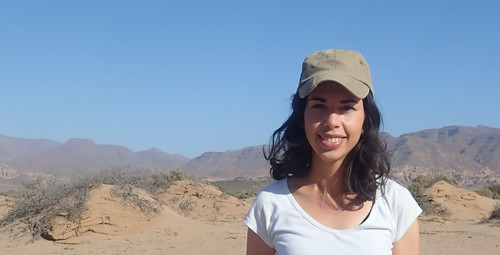
Dr. Lucia Cobo-Sanchez
Email: lcobosanuni-koeln.de
Dr Lucia Cobo-Sanchez is an archaeologist specialising in prehistoric archaeology, hunter-gatherer subsistence strategies and mobility, agent-based modelling and spatial statistical analysis, and spatial simulations. Her previous research includes participation in archaeological excavations in Olduvai Gorge, Tanzania (TOPPP research project) where she was the excavation supervisor and responsible for archaeofaunal collections, as well as work at the Institute of Evolution in Africa (IDEA) in Madrid. Her dissertation dealt with the taphonomic and spatial investigation of the archaeological site DS Bed I in the Olduvai Gorge (Tanzania). For this, she received the Tübingen Promotion Prize for Early Prehistory and Quaternary Ecology 2022 (notification of the award of the promotion prize).
References
- Stander, P.E., Ghau, //., Tsisaba, D., ǂOma, //., /Ui, /., 1997. Tracking and the interpretation of spoor: a scientifically sound method in ecology. Journal of Zoology 242, 329–341. DOI: 10.1111/j.1469-7998.1997.tb05805.x
Next: Picture gallery